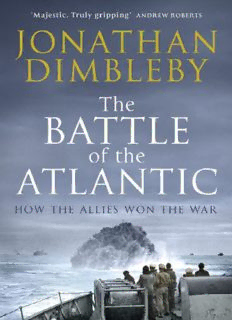
The Battle of the Atlantic: How the Allies Won the War PDF
Preview The Battle of the Atlantic: How the Allies Won the War
Jonathan Dimbleby THE BATTLE OF THE ATLANTIC How the Allies Won the War Contents List of Maps and Illustrations Preface: A Momentous Victory 1 The Phoney War that Wasn’t 2 Caught Hopping 3 Rash Moves 4 The End of the Beginning 5 U-Boats on the Rampage 6 Churchill Declares ‘The Battle of the Atlantic’ 7 Moving the Goalposts Again 8 America Goes for It 9 Secret Weapons 10 Fingers in the Dyke 11 Shifting Fortunes 12 Beating the Drum 13 Overstretched Everywhere 14 Disaster in the Arctic 15 Goading the Bear 16 Dönitz Seizes His Chance 17 Changes at the Top 18 ‘The Battle of the Air’ 19 A Very Narrow Escape 20 A Dramatic Turnabout 21 The Reckoning 22 The Beginning of the End Epilogue: Fates Disentwined Illustrations Select Bibliography Notes Acknowledgements Follow Penguin By the same author Richard Dimbleby: A Biography The Palestinians The Prince of Wales: A Biography The Last Governor: Chris Patten and the Handover of Hong Kong Russia: A Journey to the Heart of a Land and Its People Destiny in the Desert: The Road to EI Alamein For Daisy and Gwendolen in the hope that one day they will want to know how Britain was saved from the Nazis Maps and Illustrations Maps The Home Waters The Mediterranean The Eastern Seaboard The Atlantic Convoy Routes The Arctic Convoy Routes Illustrations 1. Winston Churchill and Franklin D. Roosevelt at their first formal meeting, at Placentia Bay, in August 1941 (© akg-images) 2. Sir Charles Forbes, commander-in-chief of the Home Fleet, 1938–40 (© Illustrated London News Ltd/Mary Evans) 3. Churchill and Admiral Sir John Tovey arriving on board HMS King George V, October 1942 (© IWM [A 12204]) 4. Admiral Sir Percy Noble addressing the ship’s company of HMS Stork at Liverpool (© IWM [A 8663]) 5. Admiral Sir Dudley Pound, the First Sea Lord, 1939–43 (© Popperfoto/Getty Images) 6. Admiral Sir Max Horton, commander-in-chief of the Western Approaches Command, 1942–5 (© IWM [A 17423]) 7. Sir Arthur Harris, the commander-in-chief of Bomber Command (© IWM [CH 13020]) 8. Admiral Ernest King (Mary Evans/The Everett Collection) 9. Admiral Harry ‘Betty’ Stark, the US Navy’s Chief of Naval Operations, 1939–42 (© Bettmann/CORBIS. All rights reserved) 10. Harry Hopkins, Roosevelt’s closest aide, posing with Josef Stalin (© Margaret Bourke-White/Getty Images) 11. German Admiral Erich Raeder, commander-in-chief of the Kriegsmarine (Everett Collection/Mary Evans) 12. Admiral Karl Dönitz, commander-in-chief of the U-boat fleet (Sueddeutsche Zeitung Photo/Mary Evans) 13. Hitler presents the Knight’s Cross to Günther Prien (© akg- images/Ullstein Bild) 14. Otto Kretschmer, German submarine commander (© Ullstein Bild/Getty Images) 15. New recruits to the Merchant Navy (© IWM [A 4469]) 16. Survivors from the SS Athenia, sunk on the first day of the war (© IWM [HU 51008]) 17. The German pocket battleship Admiral Graf Spee sinks in the River Plate, Montevideo, Uruguay (Everett Collection/Mary Evans) 18. The destroyer HMS Eskimo, damaged during the Battle of Narvik, May 1940 (© IWM [N 233]) 19. The German battleship Bismarck, sunk on 27 May 1941 (© akg- images) 20. Survivors from the Bismarck are pulled aboard HMS Dorsetshire 21. Teams drawn principally from the ranks of the WRAF and the WRNS charting the shifting positions of the Atlantic adversaries (© IWM [A 9891]) 22. A U-boat entering one of the bomb-proof pens in the port of Lorient 23. Survivors of the SS City of Benares (© AP/Press Association Images) 24. British housewives queue to buy eggs in 1940 (Grenville Collins Postcard Collection/Mary Evans) 25. Officers on the bridge of a British Warship escorting an Atlantic convoy in 1941 (© IWM [A 5667]) 26. The torpedo room of a German U-boat (© akg-images) 27. A German U-boat crew at rest (© akg-images/Ullstein Bild) 28. A Hedgehog anti-submarine mortar mounted on the destroyer HMS Westcott (© IWM [A 31000]) 29. PQ17 in Hvalfjord, Iceland, June 1942 (© IWM [A 8953]) 30. Arctic conditions on an Allied merchant ship (© AP/Press Association Images) 31. At least 400 US merchant ships were sunk by U-boats in the first half of 1942 (© Hulton Archive/Getty Images) 32. By 1943, Atlantic convoys frequently exceeded sixty vessels in size (© akg-images) 33. U-boat POWs were few in number (Everett Collection/Mary Evans) 34. Patriotic poster distributed in British ports (© IWM [Art.IWM PST 14440]) 35. Officers in the Plot Room at the Admiralty in December 1942 (© IWM [A 13205]) 36. Bletchley Park, the secret headquarters of the Government Code & Cypher School (GC&CS) (© Bletchley Park Trust/Getty Images) 37. The Enigma machine, which the German high command used to encrypt secret military traffic (Interfoto/Mary Evans) 38. An emergency feeding centre in Liverpool (© IWM [V 50]) 39. A rating inscribing another U-boat kill on board HMS Hesperus (© IWM [A 20897]) 40. D-Day, 6 June 1944: British commandos land on Gold Beach (© IWM [B 5246])
Description: